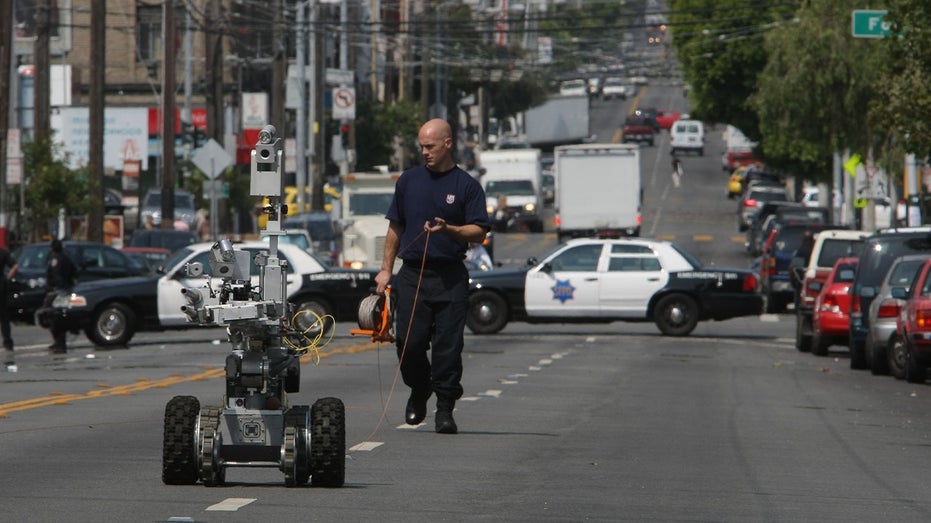San Francisco police may deploy robots as deadly force option, officials take up final vote
Board previously voted on the policy in late November
San Francisco mayor pledges again to crack down on drug sales
Mothers Against Drug Deaths Jacqui Berlinn discusses how the San Francisco mayor is under pressure to remedy this drug crisis in the city on ‘Fox Business Tonight.’
San Francisco’s board of supervisors is slated to put a proposed policy that would permit police officers to use robots in certain "extreme" emergency scenarios as a "deadly force option" to a second vote.
The vote is scheduled for Tuesday, when the 11-person panel must vote on a policy that would allow the San Francisco Police Department (SFPD) to use robots as a "deadly force option" in instances where "risk of loss of life to members of the public or officers is imminent and officers cannot subdue the threat after using alternative force options or de-escalation tactics or conclude that they will not be able to subdue the threat after evaluating alternative force options and de-escalation tactics."
SFPD Chief William Scott, in a statement posted Thursday by the department, described deploying robots in situations potentially requiring deadly force as a "last resort option." The proposed policy also includes a line stating three high-ranking police officials would be the only ones who have the authority to give the go-ahead for officers to take such action.
Tuesday’s meeting will mark the second time the board of supervisors has voted on the policy. They previously voted 8-3 on Nov. 29 to advance the policy after slightly amending the language, Fox News Digital reported.

The San Francisco Police bomb investigating robot, returns from down 16th street after looking over the device on July 25, 2008. (Photo By Michael Macor/The San Francisco Chronicle via Getty Images) (Michael Macor/The San Francisco Chronicle via Getty Images / Getty Images)
CONCERNS ESCALATE OVER SAN FRANCISCO'S RISING CRIME HURTING BUSINESS
"The SFPD does not own or operate robots outfitted with lethal force options and the Department has no plans to outfit robots with any type of firearm," SFPD spokesperson Allison Maxie told FOX Business the day after the board’s initial vote.
The SFPD has a total of 17 remote-controlled robots, including five that are not functioning, according to the proposed "law enforcement use of equipment" policy.

San Francisco Police Chief Bill Scott answers questions during a news conference in San Francisco, on May 21, 2019. (AP Photo/Eric Risberg) (AP Photo/Eric Risberg, File / AP Newsroom)
"As an intermediate force option, robots could potentially be equipped with explosive charges to breach fortified structures containing violent, armed, or dangerous subjects or used to contact, incapacitate, or disorient violent, armed or dangerous suspects who pose a risk of loss of life to law enforcement or other first responders by use of any other method, approach, or contact," the SFPD spokesperson continued. "While an explosive charge may be considered an intermediate force option, it could potentially cause injury or be lethal."
Such robots "would only be used in extreme circumstances to save or prevent further loss of innocent lives," Maxie said, adding that the SFPD "must be prepared, and have the ability, to respond proportionally" to situations.

A woman holds up a sign while taking part in a demonstration about the use of robots by the San Francisco Police Department outside of City Hall in San Francisco, Monday, Dec. 5, 2022. (AP Photo/Jeff Chiu) (AP Photo/Jeff Chiu / AP Newsroom)
The proposed policy comes as part of compliance with California’s A.B. 481. For funding, acquiring and using military-grade equipment, the state regulation, which was signed into law last year, mandates for law enforcement agencies to receive approval from their "applicable governing body."
One supervisor, Gordon Mar, tweeted Monday that he plans to vote "no" after having voted in favor last time "despite my own deep concerns with the policy" and "additional guardrails were added." He said he doesn’t think "removing the immediacy and humanity of taking a life and putting it behind a remote control is a reasonable step for a municipal police force."
"I do not think robots with lethal force will make us safer, or prevent or solve crimes," he continued. "In the balance between safety and civil liberties, I see the clear and compelling civil liberties concerns here, and I do not see enough of a safety benefit to justify them."
If the policy gets a second vote of approval from the board of supervisors later Tuesday afternoon, it will go to Democratic Mayor London Breed’s desk for her consideration.

San Francisco Mayor London Breed talks during a briefing outside City Hall in San Francisco on Dec. 1, 2021. (AP Photo/Eric Risberg, File)
Breed’s office told FOX Business in a Monday statement that the mayor "supports policies that allow police officers to quickly and safely respond to situations that involve a risk of violence to the public," adding that tools such as "live video or robotics technology" should "be available to peace officers to employ to save lives."
"This policy strikes a good balance between protecting lives and establishing guardrails to prevent misuse," the statement continued "If the police are called to serve in a situation where someone intends to do harm or is already doing harm to innocent people, and there is technology that can help to end the violence and save lives, we need to allow police to use these tools."




















